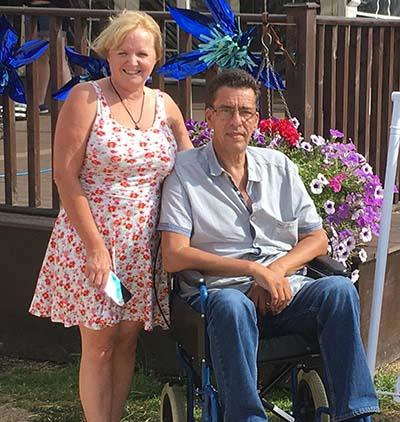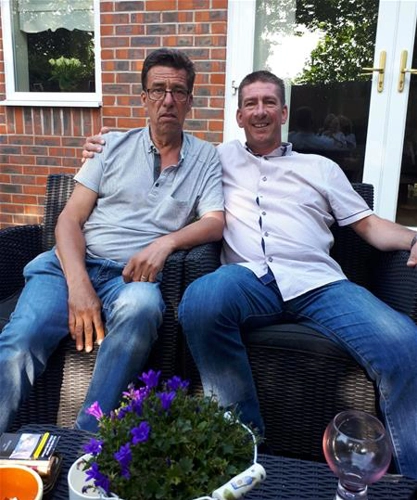When Phil Southwell, 61, from Bedmond, was diagnosed with oesophageal cancer in April 2015, he was given 6-18 months to live. The Hospice was there to help him to live his precious life well...
“It all started in March 2015. I’d been on heart meds for two or three years since having a mild heart attack but for a couple of weeks I’d been struggling to eat. We’d gone out for dinner with my daughter-in-law and I was enjoying my favourite steak when all of a sudden I had a really severe pain in my chest.
My wife Jayne rushed me to Watford Hospital where all my vitals seemed fine but after an urgent endoscopy at Hemel and further scans at Mount Vernon, less than two weeks later I learned the bad news. I had an aggressive cancer on the bend of my oesophagus just below my throat.
It was a pretty devastating blow but as a person, I’ve always been the type to take a negative and try to turn it into a positive so I thought OK, what’s next?
Surgery wasn’t an option, the consultant explained, but palliative chemotherapy was and it could give me six to 18 months to live.
They didn’t mess around because I couldn’t eat so they started me straight away on six sessions of chemotherapy every three weeks to reduce the 5cm tumour.
The first week would be horrible with lots of sickness, diarrhoea, sweats and feeling weak. The second would be more comfortable, although I’d still feel fairly weak and by the third everything would be fine but then the whole cycle would start again.
Because I responded so well, they put me on a second, stronger chemotherapy regime every week for six weeks, combined with targeted radiotherapy every day for 28 days to attack the minor spread to my lymph glands and stomach.
I just knew this was what I had to suffer to get through it and my MacMillan nurse referred me to The Hospice of St Francis for support. I remember pulling up on my first visit for some aromatherapy massage, looking at the sign saying ‘Hospice’ and thinking ‘what am I doing here?’ It felt a bit surreal. But six sessions every two weeks with Sandy, a complimentary therapist, were fantastic and really helped me relax and eased my cramps.
Jayne fell apart to start with, not knowing how she was going to cope or what to expect. She’d come home from work and I’d be in bed because the chemo drugs just knocked me out and all she could do was sit there and think this was what it was going to be like after I’ve gone.
She needed to talk to someone and really helpfully, she was able to have six sessions of one-to-one counselling with someone from the Hospice’s bereavement team who really understood what she was going through and could listen and give advice.
She had support from Claire in the Hospice’s Carers’ Support team, who assessed her needs and gave her a safe space to share her concerns and fears. Juliet, a Clinical Nurse Specialist in the Hospice’s community nursing team, would also call us regularly to see how we were managing. Knowing she was always at the other end of the phone if ever we needed help was a great comfort.
After the fifth session of chemotherapy, my consultant said he had some very good news. The cancer was still there but the scanner had failed to pick up the nodes in my stomach and the tumour in my oesophagus had been reduced to the size of a pea. He cancelled the sixth session, booked me in for three-monthly check-up scans and told me to go home and enjoy my life. For over a year, I did.
My brother treated us to a fabulous holiday in Corfu; I celebrated my 60thbirthday with a wonderful party for family and friends at Bedmond Football Club and I’ve experienced the joy of holding my tiny granddaughter Mya, born seven weeks premature and who I might never have met.
I looked well, it was easy to think everything was going to be fine, but we were on holiday with friends back in Corfu in October 2017 - end of the season, nothing to do except eat, drink and laze by the pool when suddenly I was struggling to eat again. I didn’t really want to say anything to Jayne but she noticed. ‘I think it’s back,’ I said.
Back home, we got onto Mount Vernon and a scan revealed the worst – it was back, bigger than before and more aggressive. I reverted to a liquid diet of smoothies, soups and protein drinks and they lasered off some of the tumour.
But in January this year I had to have a stent fitted over the tumour to straighten my oesophagus, help keep it open and stop me dying of starvation. Like a boil, which doesn’t hurt until you press it, whenever I ate, it was extremely painful.
To help manage my pain and control my symptoms, which include chronic fatigue and sickness, Juliet my Hospice nurse and her colleague Helena started coming to see me at home. They come at least once a week and Juliet’s view is that I shouldn’t be in any pain at all so the first thing she did was put me on strong morphine-based painkillers.
They sorted my Blue Badge for parking and they’ve dealt with all the aggravation of sorting my PIP (Personal Independence Plan) benefits because I’ve had to give up work. None of it would have happened so quickly if it wasn’t for them.
Because I’m on morphine, I can’t drive anymore which was my last little bit of independence, but during the last three months I’ve taken part in a wonderful bit of research the Hospice is part of to assess how common constipation is in patients taking strong painkillers for cancer-related pain.

STOIC stands for Study of Opioid Induced Constipation and every week, Barbara from the research team at the Hospice comes and asks me lots of embarrassing questions about my bodily functions so they can assess the impact and investigate different ways of managing the problem. I find the whole thing extremely amusing and have made a bit of a joke of it but it’s given me a focus and something to do which can hopefully help others.
My best friend JJ, who spends Wednesdays and Saturdays with me playing Play Station golf, said, ‘It’s the perfect job for Phil – he’s talked s..t all his life!’
Humour is the only way I know how to deal with all this. It’s not easy to be told you’re going to die and all the people you love are going to be left behind. I’ve shed a few tears. I’ve had moments – not many but a few - when the pain has been so bad that I’ve thought I can’t go on and there have been times when we’ve got into bed and both sobbed.
But whatever life I have left, I have to enjoy and the Hospice is helping me to live my precious life well.
I continue to have outpatient appointments with the Hospice’s specialist doctors so they can review my meds and adjust them if necessary. I’m tolerating the side effects of the increased morphine well but I’ve no idea how long I can take it before it sends me round the bend.
The one thing I want to do is go fishing again. I haven’t been for about eight months but JJ’s going to take me to a disabled venue where we can park near the lake and I’m really looking forward to that.
I’m also doing a 5k walk for the Hospice – my own walk with nearly 50 family members and friends. All the Hospice wants to do is help you so I want to help them even if it’s only a little bit. So far we’ve raised £1,700 but my target’s £2,500.
To have lived for three years is incredible. I’ve seen the birth of two grandchildren, my mum and dad are still around and visit me regularly, I can still look after myself, wash and shave and on the upside I’ve lost five stone – I weight 86kg now compared to 107.

Every single day is about finding another reason to get up and go – and the Hospice is helping me to do that. I have good and bad days but as I told JJ when he asked me ‘at what point do you give up?’ I said even if I can have one good day every week, life’s worth living. It’s only when there are no good days that my head’s going to say stop.
And when I do, this sounds macabre, but I’m almost looking forward to coming to the Hospice. I can have my own room on the ground floor with a flat screen TV and French windows onto the garden so I can sneak outside and have a crafty fag. My favourite Indian has promised they’ll deliver to the Hospice at no extra charge and I know my family and friends will all be able to come and visit and even stay over so we can make the most of every precious moment.
Now’s not my time but knowing that the Hospice will be there for me and make me as comfortable as possible at the end means a lot. Knowing that in the last week or 10 days of my life I’m not going to be in pain and I’ll be properly cared for – what more can you ask for?”
Sadly Phil passed away at the Hospice in Autumn 2018.








Share Article